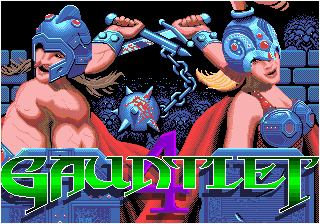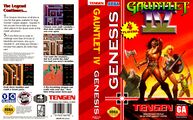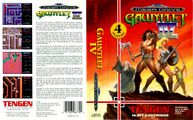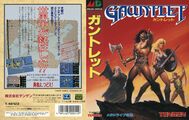Gauntlet IV
From Sega Retro
- For the Sega Master System game, see Gauntlet.
This short article is in need of work. You can help Sega Retro by adding to it.
| Gauntlet IV | |||||
|---|---|---|---|---|---|
| System(s): Sega Mega Drive | |||||
| Publisher: Tengen | |||||
| Developer: Tengen, M2 | |||||
| Peripherals supported: 4 Way Play | |||||
| Genre: Action, RPG (JP box says both; Sega of Japan master list only says Action) | |||||
| |||||
Gauntlet (ガントレット) is a 1985 arcade game by Atari Games. In 1993, subsidiary Tengen created an expanded reamke on the Sega Mega Drive, calling it Gauntlet in Japan and Gauntlet IV elsewhere.
Gauntlet IV contains the original up-to-four-players arcade mode as well as three new modes:
- Quest Mode: where players fight through five towers full of Gauntlet gimmicks
- Battle Mode: where two or more players compete to survive in either a Normal Battle, Equal Battle, or Password Battle
- Record Mode: where players try to run through the original levels to see who can get through first
These new modes are accompanied by new music composed by Masaharu Iwata and Hitoshi Sakimoto.
![]() shoots your weapon, which will go to the edge of the screen unless it hits something. START will open the pause menu, which cycles between status, equipment, items, and password for continuing later with the D-pad.
shoots your weapon, which will go to the edge of the screen unless it hits something. START will open the pause menu, which cycles between status, equipment, items, and password for continuing later with the D-pad. ![]() appears to do something; exactly what is unknown (please add it here).
appears to do something; exactly what is unknown (please add it here).
Quest Mode Storyline
In the game's world, adventurers are people who go out to solve mysteries through adventure, turning the mysteries into legends. One mystery remains, called "The mystery protected by the old castle towers." These towers — representing the elements fire, earth, wind, and water — are enchanted with a curse which you, the adventurer willing to unravel the mystery, must break to enter the castle and find the rumored treasure inside.
Production Credits
Credits are split into two screens — the first screen (presumably) has the original arcade version credits:
- Designer/Programmer: Ed Logg
- Game Programmer: Bob Flanagan
- Video Graphics: Sam Comstock, Susan G. McBride, Alan Murphy, Will Norble, Dave Pettigrew
- Engineer: Pat McCarthy
- Technician: Sae Oh, Cris Drobny
- Sound Design: Hal Cannon, Earl Vickers
- Cabinet Design: Ken Hata
- Special Thanks To: Dave Theurer, Mike Albaugh, and many others
The second screen has the Mega Drive conversion credits:
- Programmer: Tetsuya Abe
- Graphic Converter: Masatoshi Kawasaki, Naoki Horii
- Music Arrange & Compose: Hitoshi Sakimoto, Masaharu Iwata
- Test Player: Gorou Sumiyoshi
- Adviser: Jun Amanai, Takahiro Takeda
- Special Thanks To: Chris Ryu Tang, Kawachi, Kibu, Maruchika, and many others



